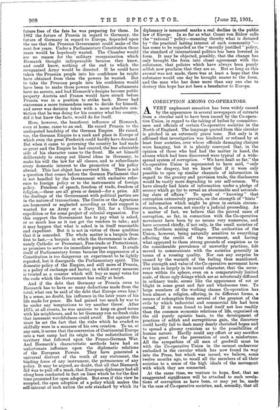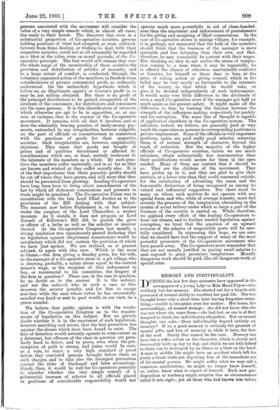CORRUPTION AMONG CO-OPERATORS.
AVERY unpleasant sensation has been widely caused by the appearance in several newspapers of extracts from a circular said to have been issued by the Co-opera- tive Union, in regard to the taking of bribes by committee- men and officials of certain Co-operative societies in the North of England. The language quoted from this circular is pitched in an extremely grave tone. Not only is it affirmed that investigation was hindered or refused by at least four societies, over whose officials damaging charges were hanging, but it is plainly. conveyed that, in the opinion of those who had had the matter in hand, the abuses which had been discovered were typical of a wide- spread system of corruption. "We have dealt so far," the Co-operative Union is represented to have said, "only with the drapery, but we know that if it were only possible to open up similar channels of information in regard to the grocery and provision trade, the disclosures would be vastly more degrading to our self-esteem. We have already had, hints of information under a pledge of secrecy which go far to reveal an abominable and astonish- ing state of affairs." To speak of " knowing " that corruption extensively prevails, on the strength of "hints" of information which might be given in certain circum- stances, is, of course, not exactly a judicial proceeding. As a matter of fact, we believe that the proved cases of corruption, so far, in connection with the Co-operative movement have been by no means very numerous, and have occurred chiefly, if not only, in the small societies of some Northern mining villages. The authorities of the Union, however, being naturally sensitive to everything affecting the credit of the movement, and having what appeared to them strong grounds of suspicion as to the considerable prevalence of unworthy practices, felt moved to communicate with the societies generally in terms of a rousing quality. Nor can any surprise be • caused by the warmth of the feeling thus manifested. The strength and value'of the Co-operative movement have ever lain so largely in its moral character, that the occur- rence within its sphere, even on a comparatively; limited scale, of those ugly doings which are so notoriously diffused in ordinary trade, seems like the appearance of rot or blight in some great and fair and wholesome tree. To large numbers of the working classes Co-operation has been almost a religion, offering, in its different forms, a means of redemption from several of the greatest of the evils by which industrial and commercial life had been cursed. If it were found to lend itself not less readily than the common economic relations of life, organised on the old purely egoistic basis, to the development of practices of selfish and. surreptitious gain, the discovery could hardly fail to dash many dearly cherished hopes and to spread a gloomy cynicism as to the possibilities of human nature. Hardly could any effort or any sacrifice be too great for the prevention of such a misfortune. All the sympathies of all men of goodwill must be with the Co-operative Union in the earnest endeavour embodied in the circular which has now found its way into the Press, but which was issued, we believe, some twelve months ago, to recall all the members of all their societies to a sense of the high ideals of the movement with which they are connected.
At the same time, we venture to hope, first, that no exaggerated significance will be attached to such revela- tions of corruption as have been, or may yet be, made in the case of Co-operative societies, and, secondly, that all persons associated with the movement will consider the value of a very simple remedy which, in almost all eases, lies ready to their hands. The discovery that, even in a substantial proportion of Co-operative societies, persons holding positions of trust had accepted, or even solicited, favours from firms dealing, or wishing to deal, with their respective societies, could not at all reasonably be regarded as a blow at the value, even on moral grounds, of the Co- operative principle. The fact would still remain that over the whole range of the membership of those societies the provision and distribution of articles of necessity, and to a. large extent of comfort, is conducted, through the voluntary organised action of the members, in freedom from considerations of private commercial profit, as ordinarily understood. On the melancholy hypothesis which is before us, an illegitimate agent's or trustee's profit is, or may be, not seldom obtained. But there is no profit of the principal distributors to be gained, irrespective of the interests of the consumers ; for distributors and consumers are the same persons. It is this identification of interests which otherwise are apt to be in opposition, or, at any rate, at variance, that is the essence of the Co-operative movement. It remains, with all that it involves, and so does the admirably bracing practice of ready-money pay- ments, untouched by any irregularities, however culpable, on the part of officials or committeemen in connection with the purchase of goods for their respective societies. Such irregularities are, however, emphatically injurious. They mean that goods are bought at prices and of qualities determined or affected by considerations which are, at least, entirely irrelevant to the interests of the members as a whole. By such prac- tices the members suffer materially, and in so far as they are known and winked at they suffer morally also. It is of the first importance that these parasitic profits should be cut off where they have grown, and still more that they should be prevented from growing. Leading Co-operators have long been keen to bring about amendments of the law by which all dishonest commissions and presents in trade might be penalised. The Co-operative Union was in consultation with the late Lord Chief Justice as to the provisions of his Bill dealing with that subject. The measure now before Parliament is, or has become under the auspices of the Lord. Chancellor, a weaker measure. As it stands, it does not propose, as Lord Russell of Killowen's Bill did, to punish the giver or offerer of a bribe as well as the solicitor or receiver thereof. At the Co-operative Congress last month, a strong resolution was unanimously passed declaring that no legislation against illegitimate commissions would be satisfactory which did not contain the provision of which we have just spoken. We are inclined, as at present advised, to agree with this view. Which is the more to blame,—the firm giving a Sunday gown, for his wife, to the manager of a Co-operative store in a pit village, who is drawing, probably, a salary about equal to the current miner's wage, or the recipient of that inducement to buy, or recommend to his committee, the drapery of the firm in question ? There can, in the case in question, be no doubt as to the answer. It is the seducer, and not the seduced, who in such a case as this deserves the severer penalty, and for him to escape scot-free while the man whose virtue he has successfully assailed was fined or sent to gaol would, in our view, be a grave scandal.
We believe that public opinion is with the resolu- tion of the Co-operative Congress as to the require- ments of legislation on this subject. But we gravely doubt whether it is in the enactment of such legislation, however searching and severe, that the best protection lies against the abuses which have been found to exist. The fear of detection would certainly operate to some extent as a deterrent, but offences of the class in question are pecu- liarly hard to detect, and to prove, even when the pre- sumption of guilt is strong, and juries would be sure, as a rule, to exact a very high standard of proof before they convicted persons brought before them on such charges, and to take also the strongest precaution against the risks of blackmail and false accusations. Surely, then, it would be well for Co-operators generally to consider whether the very simple remedy of a substantial increase of salaries to all officials placed in positions of considerable responsibility would not operate much more powerfully in aid of clean-handed- ness than the enactment and enforcement of punishments for the giving and accepting of illicit commissions. In the case of Co-operative stores in mining villages, for example, it is, perhaps, not unnatural that the bulk of the members should think that the business of the manager is more agreeable and less fatiguing than their own, and that, therefore, he may reasonably be content with their wages. But, thinking so, they do not realise the stress of tempta- tion coming to a man when, it may be repeatedly, he is offered the chance of otherwise unattainable comforts or luxuries, for himself or those dear to him, at the price of taking action or giving counsel, which in his belief may be very nearly as favourable to the interests of his society as that which he would take, or give, if he decided independently of such inducements. It would make very little difference to the dividends of even a small Co-operative store if the manager got half as much again as his present salary. It might make all the difference to him, by turning the balance between the strength of the influences making respectively for probity and for corruption. The same line of thought is capable' of application elsewhere in the Co-operative system. The salesmen, indeed, we believe, are generally paid at very, much the same rates as persons in corresponding positions in private employment. Some of the officials in very important positions, again, are paid really good salaries, removing them, if of normal strength of character, beyond the reach of seduction. But the majority of the higher officials of Co-operative societies, unless we are much mistaken, obtain substantially less remuneration than their qualifications would secure for them in the open market. Many of them are content that it should be so. They are the children of the movement. They have grown up in it, and they are glad to give their services, at a lower rate than they could command outside, for the satisfaction of advancing the cause and the' honourable distinction of being recognised as among its valued and influential supporters. But there must be many on whom such motives do not operate with any special force, and who, while of average honesty, must feel severely the pressure of the temptations abounding in the system of secret bribery under which so large a part of the business of the country is carried on. While, therefore, we applaud every effort of the leading Co-operators to hunt out abuses, and to further needed legislation against corruption, we trust that the question of an upward revision of the salaries of responsible posts will be care- fully considered. In expressing this hope, we are sure that we should have had the support of many of the most powerful promoters of the Co-operative movement who have passed away. The Co-operators must remember that they are not morally justified in paying small salaries to men exposed to great pecuniary temptations. Morally dangerous work should be paid, like all dangerous work, at special rates.











































 Previous page
Previous page